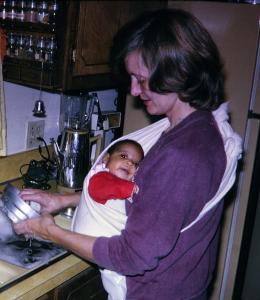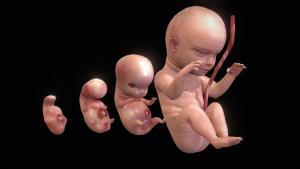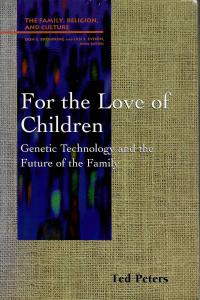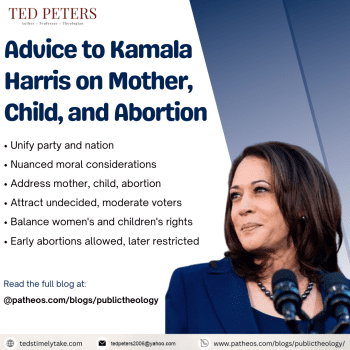Abortion access for women’s health?
What about the baby?
Patheos PT 112. Let’s ask Juliet Bongfeldt
 Abortion access for women’s health? What about the baby? This question appears on a list of questions I asked in a recent Patheos column post, “Children, Guns, and Abortion.”
Abortion access for women’s health? What about the baby? This question appears on a list of questions I asked in a recent Patheos column post, “Children, Guns, and Abortion.”
Among those commenting on the post is a person whose judgment I highly respect. She’s Juliet Bongfeldt. Juliet is a hybrid. She’s been a Kaiser nurse practitioner specializing in women’s health. She’s also an ordained Lutheran pastor. Science and faith partner in Pastor Juliet’s mind like pasta and meatballs.
As America waits with breathless anticipation to see who wins the battle over abortion access now being fought by federal court judges, Republican state legislatures, the FDA, the White House, and even the U.S. Supreme Court, the moment demands that we Christian citizens clarify our minds on how to think about abortion access. Juliet Bongfeldt can help us here for this exercise in public theology.
One concern I raised in the earlier post is about the misleading sloganeering we hear from Democrats along with CNN and MSNBC: free abortion access must be justified solely on the basis “women’s health” or “reproductive care”. So, I ask, what about the dignity and wellbeing of the yet-to-be-born baby? Why is this not a moral concern for the liberals and progressives among us?
We want both women’s health as well as compassion for the yet-to-be-born. Not one without the other.
But it’s complicated. That’s a big part of Juliet’s argument. So, I set before you in Juliet’s words an attempt to sort out the details of just how complicated the matter of abortion access can be.

Juliet Bongfeldt on how to understand abortion access.
- A fertilized ovum is not an unborn baby or a person. I cannot assign the same human value to an embryo as I can to a full-term baby or any other person. I recognize that this is a subjective value judgement which others will dispute.
- The embryo is, however, not without human value. It has the potential to develop into a person, and therefore should be treated with discretion and respect.
- There are occasions where the life and circumstances of the pregnant mother take precedence over the development of the embryo/fetus and justify aborting it.
[Ted’s comment. This principle, I think, gives expression to what was intended in Roe vs Wade of 1973]
- The further along the pregnancy has proceeded the more significant an abortion will be.
- What I do not know is at what point the fetus acquires ‘personhood’ and should be protected–i.e., at what point the life of the fetus supersedes the circumstances of the mother’s life.
- The sticky question therefore is at what point government should protect the life of the embryo/fetus. This was previously decided in Roe vs Wade, where viability was the criterion used. This is controversial, because with medical advances viability has been pushed back to 21-22 or so weeks of gestation in many cases. In fact, the overwhelming majority of abortions are performed in the first trimester, with second trimester (up to 24 weeks) abortions performed mostly under exceptional circumstances. I personally could live with a 15-week standard, provided adequate exceptions were made for unusual circumstances. For instance, many young teens try to hide their pregnancy until the second trimester, when it is obvious, and pregnancy and birth at that stage is harmful to a not-yet fully grown mother.
Juliet Bongfelt addresses the pro-life anti-abortion position.
- No doubt many really believe that a fertilized ovum is morally equivalent to a full-term baby. I recognize this as the Roman Catholic position. And it is shared by many well-meaning evangelical Christians and probably others. In that case, any abortion is equivalent to murder. This is a value judgment that I can neither argue for nor support.[1]
- Roman Catholics and evangelicals who take that position want to impose that value judgment on the whole population, despite the fact that it is not shared with well over half of the people surveyed.[2]
- That value judgment and efforts to enforce it have now become required for Republicans. Any who might have a more nuanced approach do not have a voice within the party.
- Republicans at the state level where they control the legislature are taking draconian measures to ensure that no abortions are allowed. From reports, women’s lives have been put in danger because of lack of clear guidelines or exceptions.
- These proposed state guidelines are clearly more a measure to control and consolidate power than to preserve lives.
- For that reason, I believe Democrats should do all they can to preserve the right to abortion access where it is threatened. Perhaps there is some possibility of compromise measures, although unlikely in this political climate.
- From the beginning, I have wondered why those opposed to abortion don’t do more to promote research into more methods of effective and reversible contraception for both men and women. Why not do more to promote sex education and use of reliable contraception? Abortion was, in fact, declining in the US prior to Dobbs.
- The use of medication [such as mifepristone] abortion should be supported. It is safe, effective, works early in pregnancy, and eliminates the need for a surgical procedure and anesthesia.
- The FDA’s judgment regarding medications should be respected and supported.
Abortion Access Observations

What Juliet Bongfeldt has added to the current public debate over abortion access is awareness of the dignity of the yet-to-be-born baby. More than women’s health or reproductive care is at stake. The yet-to-be-born baby possesses dignity. And this dignity warrants protection. At least in the later stages of pregnancy.
But just when does an unborn fetus gain dignity and moral protection? Juliet explores criteria for determining when personhood and, hence, morally protectable dignity should begin within a pregnancy. But she’s not sure where to draw the line. Other bioethicists are similarly unsure. Despite this lack of surety, Juliet still factors in concern for the yet-to-be-born in the later stages of pregnancy.
As you the reader can see, drawing moral lines to justify just when abortion access applies is not easy. The science of fetal development does not provide us with a sharp moral line between pre-personhood and morally protectable personhood.
Setting such criteria is messy. Yet, what I appreciate in Juliet’s thinking is that the need to protect women’s health is augmented with the need to respect the protective dignity of the yet-to-be-born child.
Early embryo observations

Elsewhere I have argued that an individual potential child does not appear prior to the 14th day after conception. Further, individuation occurs only within the mother’s body, in vivo. Prior to that moment, an early embryo could become twins, quadruplets, or more. Individuation is dictated by the appearance of the primitive streak about the 14th day.
Further, a fertilized ovum in a petri dish ex vivo could not be an individual person. Even with this scientific knowledge, Vatican bioethicists contend that morally protectable human dignity applies to an embryonic individual. According to the Vatican, only an individual can become a person and hence demand protection from abortion. But, alas, such individuation occurs only when the blastocyst attaches to the uterine wall of the mother between twelve and fourteen days after conception. There is no individual human person apart from relationship to the mother in early stages of pregnancy.
Now, I ask whether the 14th day mark would also draw the line for morally protectable personhood. Well, honestly, I’m just not sure. I notice that Juliet Bongfeldt draws the line at about 20 weeks but would compromise with former Vice President Mike Pence at 15 weeks. Conservative Senator Tim Scott (R-SC) draws the line at 20 weeks. Which is right: 2 weeks, 15 weeks, or 20 weeks?
It would be helpful if the science of embryology would provide clear criteria for drawing such a line. But, alas, science—because science is value free–cannot not on its own do our bioethics for us. So, I recommend we draw a line at a threshold that makes some degree of scientific sense and then sin boldly. By sin boldly I mean set a policy on the basis of compassionate intent even if we lack complete surety that we’ve got it right.
Conclusion
My concern has been that our liberal and progressive friends have not shown the same protective compassion for unborn children as they do for school children who lay dying with bullet-ridden bodies fired from AR-15 war weapons. I believe the dignity and wellbeing of yet-to-be-born children should be protected like we want to protect our living children. But, compassion for the unborn is simply missing from the agenda of the Democratic Party.
Should our compassion for the yet-to-be-born child lead us to support the Republican Party? No. Why? Because of a deeper problem. That deeper problem, I think frankly, has to do with money and votes. Republican officials get paid to support the gun lobby. So, they persuade many evangelical Christians and some Roman Catholics to get out the anti-abortion vote. Sheepishly, these rank-and-file opponents to abortion show compassion for unborn children by supporting pro-gun Republican politicians. Behind the smokescreen of compassion for the unborn is a lack of compassion for the victims of gun massacres. Gun money is worth more than the blood shed by murdered children.
The tragic and despicable irony is that these same pro-life Republicans receive the largess from gun profiteers to support measures that insure the deaths of hundreds of school children in AR-15 massacres. That Christian supporters of the Republican party cannot see that they have been duped by heartless gun money is beyond my comprehension.
SR 5101. Abortion 1. Are frozen embryos really children?
SR 5102. Abortion 2. Protecting Embryos in the Vatican
PT 112. Abortion Access for Women’s Health? What about the Baby?
▓

For Patheos, Ted Peters posts articles and notices in the field of Public Theology. He is a Lutheran pastor and emeritus professor at the Graduate Theological Union. He co-edits the journal, Theology and Science, with Robert John Russell on behalf of the Center for Theology and the Natural Sciences, in Berkeley, California, USA. His single volume systematic theology, God—The World’s Future, is now in the 3rd edition. He has also authored God as Trinity plus Sin: Radical Evil in Soul and Society as well as Sin Boldly: Justifying Faith for Fragile and Broken Souls. His study of embryonic genetics and reproductive technology can be found in Playing God? Genetic Determinism and Human Freedom (2nd ed., 2002) and For the Love of Children. See his website: TedsTimelyTake.com.
 Watch for his new 2023 book, The Voice of Public Theology, published by ATF Press.
Watch for his new 2023 book, The Voice of Public Theology, published by ATF Press.
▓
Notes
[1] In his Patheos post, “How Evangelicals Were Deceived Into Caring So Much About Abortion,” Eric Scot English puzzles over changes in the conservative Southern Baptist Convention. What I note is the consistency of guarding the wellbeing of children both unborn and living. According to Scot English…Believe it or not, even the Southern Baptist Convention put out a statement in 1971 condoning abortion under certain circumstances “…to work for legislation that will allow the possibility of abortion under such conditions as rape, incest, clear evidence of severe fetal deformity, and carefully ascertained evidence of the likelihood of damage to the emotional, mental, and physical health of the mother.” This position was reaffirmed in 1974 and 1976. Today their statement on abortion reads differently “We should speak on behalf of the unborn and contend for the sanctity of all human life from conception to natural death.”
As suggested above, conception might be too early to make scientific sense when marking the moment of personhood. Yet, at some threshold in the pregnancy the dignity and lovability of the yet-to-be-born child needs to become society’s moral responsibility.
[2] Is abortion a biblical issue? “What does the Bible say about abortion?” “What the Bible actually says about abortion might surprise you.”













